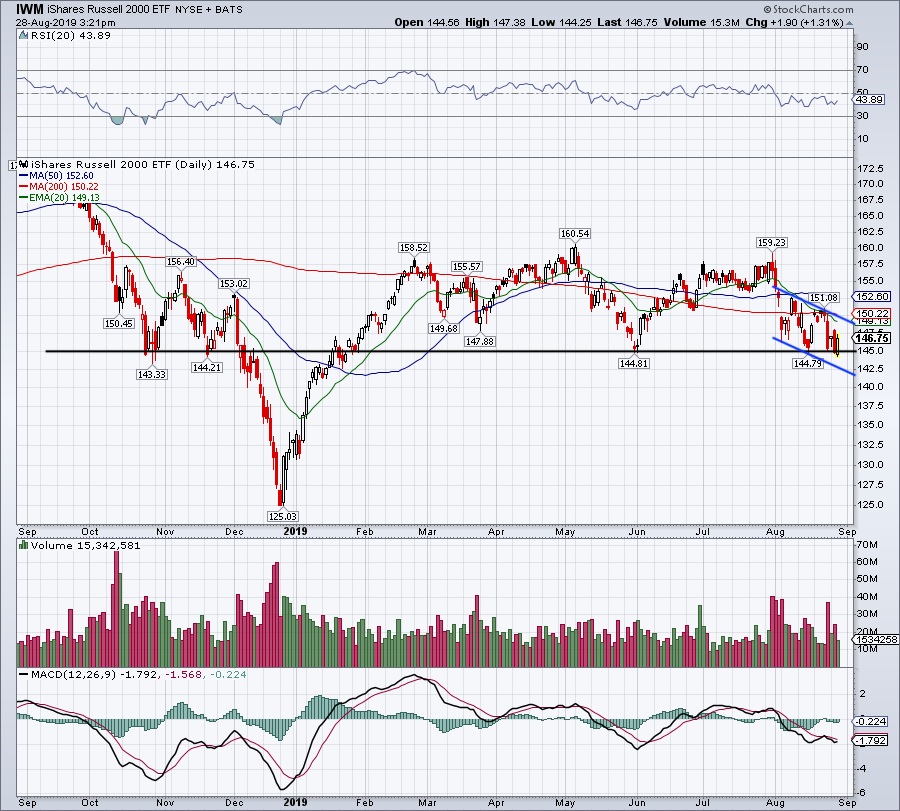While the SPDR S&P 500 ETF (NYSEARCA:SPY) is basically flat so far this week, there’s been plenty of moves between the open and the close. In the stock market today, investors saw stocks drop lower, with major indices down about 50 basis points before reversing and closing notably higher on Wednesday.
All in all, the SPY closed higher by 0.7%. However, investors were watching other key assets, including the Russell 2000. Often viewed via the iShares Russell 2000 ETF (NYSEARCA:IWM), shares jumped 1.2% on the day. Importantly though, a key level of support stood strong, allowing investors to breathe a sigh of relief.
Russell, Oil Prices in Focus
Unlike the range-bound price action we’ve seen in the SPY so far this month — which continues to improve with higher lows — investors have seen a worse development in the IWM.
The ETF isn’t bouncing between support and resistance. Instead, it’s trending lower. On Wednesday, bulls made an important stand at $145, a key level over the past 12 months. It would be quite constructive to now see the IWM push through short-term channel resistance and the 200-day moving average.

If the IWM cannot do so, it could put $145 back on the table. If it falls below this key level, it could draw in more sellers and squeeze the ETF down to channel support in the low $140s. The tricky part about this market? Headlines. Right now, all it takes is one tweet to send stocks rocketing or sinking. If that weren’t the case, the charts would be much easier to trade.
Some investors are finally starting to pay attention to oil prices, but far too many are still oblivious to the commodity. Oil prices and the S&P 500 have a notable correlation and lately, oil prices have been leading stock prices. Oil’s ability to hold up over $55 could bode well for stock bulls going forward. You don’t have to trade oil to make it a useful indicator for equities.
Bitcoin
Whoa, what happened to bitcoin on the day? Along with most other cryptocurrencies, it was slugged on Wednesday. At 1:50 P.M., bitcoin prices were roughly flat at $10,235. Within just minutes, prices slumped almost $700, hitting a low of $9,555.
So far, there’s not much of an explanation for the plunge. Was it a large seller? Did liquidity dry up momentarily? According to CryptoTrends, “Most analysts have attributed the drop to the close of the CME bitcoin futures contract, which previously has marked several pullbacks for the dominant cryptocurrency.”
The move caught a number of investors off-guard — and understandably so. Despite the fall, many are still bullish on BTC prices amid the current macro backdrop. With the Federal Reserve and other global banks resorting to more easing, and a flight to non-equity assets starting, crypto-bulls are enjoying a resurgent year in their key asset.
It will be interesting to see how bitcoin prices react to the equity markets’ moves into year end.
Movers in the Stock Market Today
Shares of Blackstone (NYSE:BX) are roughly flat on the day, but Tallgrass Energy (NYSE:TGE) certainly isn’t. The $5.5 billion market cap company caught a 35% boost on Wednesday after it received a bid from BX to acquire all the shares it and its affiliates do not already own at $19.50 per share. Now near $19.40, there’s not much upside left.
Cycling startup Peloton — yep, that’s the one — filed to go public. According to its filing, Peloton generated an impressive $915 million in sales in its last fiscal year. However, it also racked up almost $250 million in losses. Ouch. A number of investors are worried about two things, first of which are those huge losses. Second, how will Peleton hold up in a softer economic environment? To be fair, the consumer appears relatively healthy at the moment — no pun intended.
Both Ford (NYSE:F) and General Motors (NYSE:GM) caught a boost on Wednesday. That’s as auto sales dropped “just” 4.3% in China last month. According to the Wall Street Journal, it could suggest that a bottom may be around the corner in the Chinese auto market.
It may not be a great catalyst — and may not turn at all — but investors are willing to grasp at some hope. The country has logged 13 straight months of declining auto sales, which is quite the rough patch for what had been a robust auto market for about two decades prior to the decline.
Bret Kenwell is the manager and author of Future Blue Chips and is on Twitter @BretKenwell. As of this writing, Bret Kenwell did not hold a position in any of the aforementioned securities.
